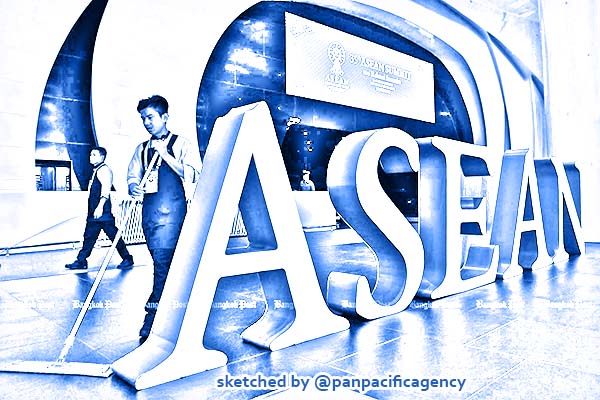US does not want to force ASEAN to choose sides: Official

ASEAN logo. Sketched by the Pan Pacific Agency.
JAKARTA, Sep 16, 2020, The Jakarta Post. The United States is not trying to push ASEAN countries to choose sides in its strategic rivalry with China, a senior US foreign policy official has insisted, as the Western superpower continues to call out Beijing’s aggressive “bullying” in the South China Sea, The Jakarta Post reported.
The US recently changed tack in its engagement with Southeast Asia, openly seeking leverage and support from ASEAN countries as it continues to antagonize China in a geopolitical rivalry that has sparked a trade war and spilled over into other global concerns, including the war on COVID-19.
The shift in policy has not gone unnoticed, with several ASEAN and individual member countries expressing no interest in getting involved and wanting to steer the region away from becoming a “stage for geopolitical contestation”.
David Stilwell, the US assistant secretary of state for East Asia and the Pacific, said that Washington wanted ASEAN countries to make choices that protected their own sovereign interests, not force them into picking sides.
“We often hear from our ASEAN friends and others this desire to ‘not make us choose’ and the US – I don't think – has ever forced a choice,” Stilwell told reporters in a telephonic briefing from Washington on Tuesday.
He then called out China’s track record of “bullying” behavior in the South China Sea and elsewhere, including in the Senkaku islands, a group of uninhabited islands claimed both by Japan and China.
“The Chinese are forcing a choice,” he said, noting in an anecdote that a Chinese official had tried to get a Singaporean friend to choose sides.
In past months, the US has renewed its position by declaring China’s claims as unlawful and moving to sanction Chinese state-owned companies that it accuses of assisting with Beijing’s military buildup in the South China Sea.
However, the policy shift has not fully convinced ASEAN countries of the US’ good intentions in the region, which observers and practitioners say has been held back by inconsistent engagement.
Last year, US President Donald Trump failed to attend the ASEAN Summit in Bangkok, opting to send minister-level officials in his place, which angered ASEAN members.
The US government has also yet to appoint an envoy to ASEAN since the beginning of the Trump administration, raising questions about its commitment to the region where experts say “showing up is half the battle”.
Meanwhile, China has criticized the US for inciting tensions at a time when ASEAN and China are in talks to produce a Code of Conduct (COC) in the South China Sea.
In fact, China’s ambassador to ASEAN, Deng Xijun, accused the US of being the main source of risks in the South China Sea.
“What the US has done is to drive a wedge between China and ASEAN countries, meddle in regional situations, undermine peace and stability in the South China Sea and make the South China Sea issue a tool for containing China,” the diplomat said in a briefing in Jakarta on Monday.
ASEAN and China have been negotiating the COC, which aims to set out some rules of engagement to prevent all-out conflict in the disputed waters.
However, the COVID-19 pandemic has become another hindrance.
“COVID-19 [has slowed] down the process of COC consultations. But we are confident about making up for the time lost. We will work more efficiently and effectively to speed up the consultations,” Ambassador Deng said.
Both sides held a special video conference of the Joint Working Group Meeting on the Implementation of the Declaration of Conduct (DOC) on Sept. 3 to discuss how to strengthen maritime cooperation and advance COC consultations.
Strategically located at the heart of the Indo-Pacific region, with the highly disputed South China Sea in its center, ASEAN has been a target of persuasion for both US and China, most apparently at the various ASEAN ministerial meetings hosted virtually by bloc chair Vietnam last week.
Chinese Foreign Minister Wang Yi and US Secretary of State Mike Pompeo took turns staking their respective country’s position on a dispute over the South China Sea.
Beijing has made sweeping claims over most of the South China Sea and rejected an international tribunal ruling that overruled them, while Washington has sought to exercise freedom of navigation there to keep its rival superpower from dominating the disputed waters.
Parts of the strategic waters are simultaneously claimed by Vietnam, Brunei, Malaysia, the Philippines and Taiwan.
The dispute was addressed in the joint communiqué of the ASEAN Foreign Ministers’ Meeting, an outcome document that must be agreed to by consensus and represents the stance of the region as a whole.
The ministers agreed to include a paragraph reaffirming the importance of “universally recognized principles of international law”, which includes the 1982 United Nations Convention on the Law of the Sea (UNCLOS).
China is a signatory of UNCLOS, while the US is not.
Speaking at the ASEAN Regional Forum over the weekend, Indonesian Foreign Minister Retno LP Marsudi underlined the importance of promoting a culture of dialogue and peaceful conflict resolution.
"For more than five decades, Southeast Asia has navigated challenges by holding onto these values and norms, which have become our guide for cooperation with partners in the region," Retno told reporters on Saturday.
"Indonesia also stated that it wants to see a peaceful and stable South China Sea, where internationally recognized international principles are upheld, including the 1982 UNCLOS," she added.